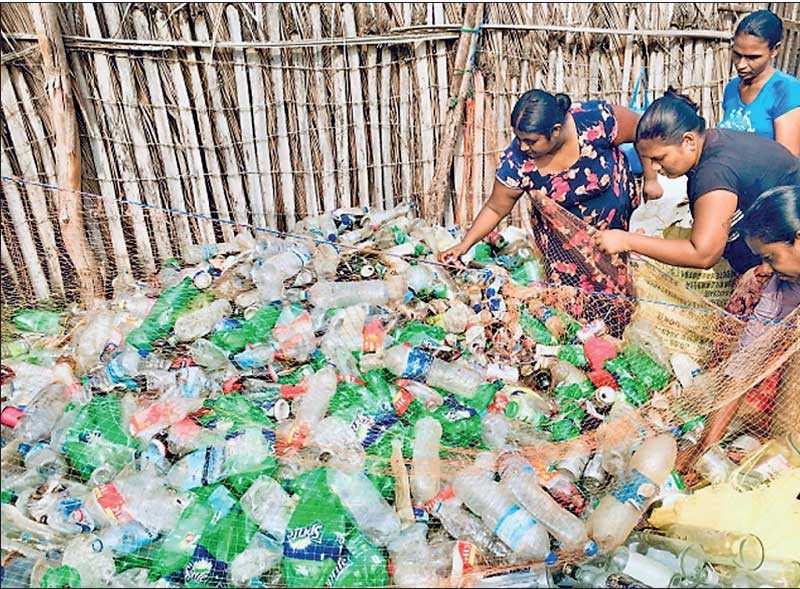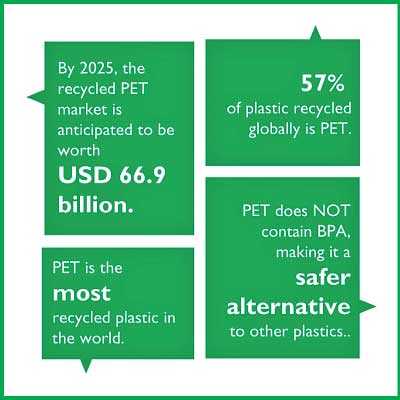Thursday Feb 19, 2026
Thursday Feb 19, 2026
Thursday, 22 October 2020 00:03 - - {{hitsCtrl.values.hits}}

PET collection – Pic courtesy Gamini Akmeemana
By Ashan Weerakoon and Nilani Priyangika
 Our Earth can’t keep up with us. According to the Global Footprint Network, it takes one year and eight months for the Earth to produce what we consume in one year. We truly have to look beyond the take–make–waste model, and this includes looking even more closely at one of the world’s most controversial materials, plastic.
Our Earth can’t keep up with us. According to the Global Footprint Network, it takes one year and eight months for the Earth to produce what we consume in one year. We truly have to look beyond the take–make–waste model, and this includes looking even more closely at one of the world’s most controversial materials, plastic.
Not all plastics are recyclable. However, Polyethylene Terephthalate (PET) – easily identified by the number “1” placed inside the recycling symbol is the most recycled plastic in the world and according to research conducted by the Commonwealth Scientific and Industrial Research Organisation (CSIRO) PET amounts to more than 57% of global recycled plastic market.
The growing importance placed on the contribution of PET to the economy is further emphasised by its fact that the market for recycled PET is anticipated to be worth approximately $ 66.9 billion by the end of 2025 (Commonwealth Scientific and Industrial Research Organisation, 2017).
PET, a 100 % recyclable material holds multiple advantages over single-use plastic (non-recyclable). For instance, PET does not contain BPA (bisphenol-A), an industrial chemical that is used to make certain types of single-use plastic. On the contrary, PET is an inert polymer, which makes it a safe and ideal material to be used in packaging.
‘Safe’ and ‘ideal’ because the contents within the PET packaging will not be exposed to external elements, and PET does not contain any adverse industrial-grade chemicals known to cause health concerns. Moreover, the manufacturing processes of PET are evolving, with a 1.5 litre PET bottle weighing 30% less than what it used to five years ago.
PET is highly resistant, lightweight and can be recycled several times to manufacture personal care products, clothing fibres, home utensils, construction materials and even industrial strapping. In Sri Lanka, a majority of recycled PET is currently exported as polymer grains, chips and pellets that are used in the manufacturing of other products – namely recycled PET (rPET) products. Recycled PET pellets are produced into clothing fibres, clothing accessories, sportswear, brooms, and brushes and are even is used in the manufacturing of high-street fashion.
While PET can be a valuable resource for the packaging and apparel industry, it can also play an important role in offsetting the ecological footprint left by single-use materials. The footprint of recycling PET is smaller than that of extracting single-use natural materials, which have a sizeable demand on arable land, clean water, fertilisers and regeneration time. Recycling PET also has a considerably smaller carbon footprint as it takes less crude oil to recycle a used PET product.
Trash is treasure; the story of a PET collector
We at Shanthi Sustainable Development provide complete solutions in waste management to businesses and local communities across Sri Lanka. With a small yet dynamic team of five members, our Environmental Consultant and two other collectors, we collect approximately 60,000 PET bottles every month.
We began operations in November 2019, and even though we have been up and running for less than a year, for us, trash is treasure and, at the core of our business is our responsibility to the environment. Our work takes us to different parts of the country where we work with local NGOs, voluntary groups, local government authorities, municipal councils, businesses and communities to create and support sustainable mechanisms towards better waste management.
We also work with individual community collectors such as your neighbourhood bothal patthara collectors, to collect all waste items created from households. Once the used PET has been collected from different locations, i.e. from beach clean-ups, collection bins, the local parisarapola, municipal council waste and local businesses, we transport this non-biodegradable waste to our warehouses to wash and sort through the collected material before taking it to the recycler, Eco Spindles (Pvt) Ltd.
The lifecycle of a PET product is continuously evolving and changes hands from a manufacturer, to consumers, to collectors, to recyclers and then back into the market again as a new product altogether. PET not only creates an expansive value chain; it also provides livelihood opportunities for many individuals and businesses down the line.
Knowing this, it is our responsibility to champion collection and recycling within local communities in the hope of empowering individuals to build their own business around waste management. Ultimately, Sri Lanka can also take on the role of being a regional hub for PET management and recycling.
PET is not the issue, irresponsible recycling is
Despite the media attention, awareness campaigns, and efforts by municipal councils across the country, the general public remains unaware about the recycling properties of PET, and more importantly, how far a PET product can go if disposed of and recycled correctly.
According to the Journal of Research Technology and Engineering of the Faculty of Engineering, University of Jayewardenepura (2020), the Western Province alone generates around 3,500 Metric Tonnes (MT) of solid waste every day, of which 2,400 MT is collected. Of this, close to 15% has become compost, 10% is recycled, and 75% is thrown into open dumps. As of now, only 20-25% of Sri Lanka’s PET is being collected for recycling. The rest is being burnt, ends up in landfills and ultimately in our waterways. This system needs to change.
For a truly circular economy to come into existence we believe that there should be a coming together of collectors, recyclers, PET manufacturers, importers, brand owners, manufacturers of rPET products, environmental authorities, the state and the informal sector that engages in waste collection. With a few common forums and no structured alliance, this disconnect amongst these different entities has caused a prolonged and somewhat disrupted recycling system.
For example, let’s look at our very own business model. Shanthi Sustainable Development first began operations within Wennappuwa and Kalpitiya. Together with the local authorities, we were able to help Chilaw recently hold the city’s first-ever ‘Parisara Pola’ to raise awareness of proper waste separation and segregation so that the community will be able to create an income supplementation with their recyclable household waste.
Close to a year into operations and after having met different kinds of consumers from the eco-conscious to ones who believe climate change is a farce, one thing is clear – education and awareness around separation, segregation and responsible recycling should be a national priority. The issue is beyond the consumption of PET.
We should actively pursue the creation of a network to support the many individuals involved in the process of waste collection, segregation and recycling. Businesses like ours not only contribute to attempting to solve the trash problem in Sri Lanka, they also provide jobs and create an entire ecosystem that contributes towards community development. Our way of doing things is reaching its limits. It is time to disrupt the system and think circular.
(The writers are the owner and project coordinator of Shanthi Sustainability Development. While overseeing the operations at Shanthi Sustainable Development, Ashan Weerakoon is a Logistics Management undergraduate with the University of Plymouth. Project coordinator at Shanthi Sustainability Development, Nilani Priyangika holds an MBA from the University of Colombo and is a management consultant. Shanthi Sustainable Development is a complete waste management and solutions provider in Sri Lanka with a mission of including a community participatory approach to promote mitigation and recycling of waste in Sri Lanka.)